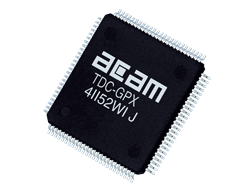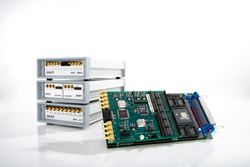Diploma thesis
Title: A Framework for Evaluation of Time Measurement based Tracking ApproachesThesis by: Stefan Machleidt
Advisor: Dipl. Inform Manuel Huber
Supervision by: Prof. Gudrun Klinker, Ph.D.
Due date: Sept. 15, 2010
Abstract
The implementation of augmented reality (AR) applications implies an adequate tracking solution, which provides the registration of virtual objects in the real environment. A wide range of different tracking approaches exist, each exhibiting its individual characteristics. The subject of this thesis are tracking approaches that are based on time measurement of a wave propagation between two or more points. This includes time of flight (TOF) as well as time difference of arrival (TDOA) tracking approaches. To provide consistent evaluation of each tracking approach or implementation, criteria for evaluation of performance, functionality and properties of a tracking system are defined. The basic principle is examined and regarding the entirety of possible implementations, a classification depending on the particular wave and certain technical aspects that are involved is conducted. For each class, the basic characteristics are discussed based on the underlying physical and technical conditions and requirements. An appropriate framework for evaluation and prototyping of time measurement based tracking approaches is specified and introduced. It provides a flexible, multifunctional and extendable design, that includes definition of the data flow in form of a directed graph. The different requirements of the particular stages in the development process are considered by adequate components: an API, an integrated programming environment and a read-for-use measurement tool. Also an adequate time measurement hardware is identified and evaluated. To analyze the performance of the new system and to obtain first findings, different tracking approaches are implemented and multiple measurements are performed. This includes an ultrasonic as well as a radio frequency (RF) based tracking approach. Finally, indications for the suitability and technical feasibility of each approach are derived.Scenarios
- leading edge vs. constant fraction discriminator
Radio waves
- transmitter: http://www.elv.de/output/controller.aspx?cid=74&detail=10&detail2=12789
- receiver: http://www.elv.de/output/controller.aspx?cid=74&detail=10&detail2=12822
Ultrasound waves
Pulse-echo technique
- same transducer is used as emitter and receiver
- threshold method: amplitude level
- digital signal processing
- application AR?
Phase-shift method
- not really TOF distance estimation...
Light waves
Visible light
- pulsed TOF technique
- echo
- 2 detectors (start / stop)
- beam splitter
- reflector
IR waves
Hardware issues
ACAM TDC-GPX

ATMD evaluation system

Tasks
- Obtain and install ACAM TDC system

- Become familiar with the system and its characteristics

- Measure the characteristics of a controllable reference oscillator
- Become familiar with timing related properties (e.g. clock jitter, clock noise, phase jitter, aperture jitter, group/signal/front velocity, wave propagation)
- Devise suitable scenarios for one-way-TOF measurement and echo-TOF measurement
- Measure the delay of a oscillator signal through a cable compared to a direct connection

- Implement and evaluate the proposed scenarios
Resources
Literature
| Students.ProjectForm | |
|---|---|
| Title: | A Framework for Evaluation of Time Measurement based Tracking Approaches |
| Abstract: | |
| Student: | Stefan Machleidt |
| Director: | Gudrun Klinker |
| Supervisor: | Manuel Huber |
| Type: | Diploma Thesis |
| Area: | |
| Status: | finished |
| Start: | |
| Finish: | 2010/07/15 |
| Thesis (optional): | |
| Picture: | |